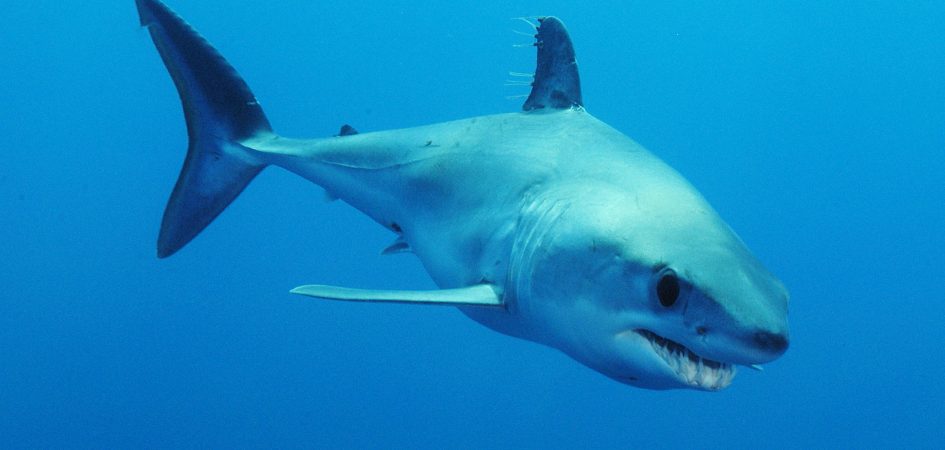
Published on: 19 August 2021

Summary of shark conservation facts
- Import and export of detached shark fins banned to promote shark conservation
- World-leading trade ban will extend to shark fin products including tinned shark fin soup
- Endangered and overfished species including shortfin mako and blue shark are among those to benefit from greater protections
The UK will go further than any other country to stop the cruel practice of shark finning, International Ocean Minister Lord Goldsmith announced recently, thanks to new legislation set to ban the import and export of shark fin products.
The UK has a strong track record in marine conservation and has been pressing for stronger international action to protect sharks against unsustainable fishing practices and shark finning, which is the practice of removing a shark’s fins at sea and discarding the finless body back into the water.
Many species of shark face significant population pressures. Out of over 500 species of shark, 143 are listed as ‘under threat’ by the International Union for Conservation of Nature (IUCN) – with different species ranging from ‘vulnerable’ to ‘critically endangered’. The presence and variety of sharks in marine areas acts as a key indicator for ocean health, while the animals also play a vital role in marine ecosystems by helping to maintain healthy levels of fish below them in the food chain.
Demand for shark fin products is a significant driver for these pressures, alongside overfishing. Banning detached fins from being brought into the UK will help to protect wild populations of shark species, such as the endangered shortfin mako shark and overfished blue shark, which have both declined rapidly, as a result of unsustainable fishing practices.
The ban will maintain the UK’s position as a world leader in protecting animal welfare, restricting the import of and export of detached shark fins as well as products which contain shark fins including soup and other products.
Animal Welfare minister Lord Goldsmith said:
“Shark finning is indescribably cruel and causes thousands of sharks to die terrible deaths. It is also unforgivably wasteful. The practice is rightly banned in UK waters, but the trade continues, with serious implications for the future of these magnificent creatures.”
“That is why we are now banning the import of both detached shark fins and shark fin products. Our action will not only help boost shark numbers, it will send a clear message that we do not support an industry that is forcing many species to the brink of extinction.”
“The UK is a global leader in marine protection, with our ‘blue belt’ programme protecting an area of ocean around British Overseas Territories the size of India, as well as plans to pilot Highly Protected Marine Areas in our domestic waters. The UK is also leading a global campaign, supported by over 80 countries, for at least 30 percent of the world’s land and ocean to be protected by 2030.”
Ali Hood, director of conservation for the Shark Trust said:
“The Shark Trust welcomes the prohibition in trade in detached fins as the next action in a history of proactive moves by the UK Government, which supported leaving fins naturally attached as best practice, years before the EU adopted the policy in 2013.”
“It is encouraging to see the UK addressing the fin trade as an element of overfishing: the principal threat to sharks and rays. And we’re noting that the UK is ramping up its engagement in domestic and international shark conservation issues, currently championing the science-based advice for a prohibition on mako in North Atlantic high-seas fisheries.”
Shark conservationist James Glancy said:
“New measures from the UK Government to protect sharks from the cruel shark fin trade are welcomed by conservationists.”
“The unsustainable rate at which sharks are caught by global fishing fleets, as bycatch or deliberately for their fins and meat, has caused a significant decline in worldwide shark populations.”
“Sharks have been around for millions of years and play a crucial role for the health of our oceans yet, as a consequence of human activity, many shark species are critically endangered and face extinction in some regions.”
We will continue to champion conservation measures for sharks through Regional Fisheries Management Organisations (the international organisations which regulate fishing activities on the High Seas) and under the Convention on International Trade in Endangered Species (CITES) which prohibits or requires trades to be carefully regulated. This ban represents another important step in our journey to delivering better shark conservation globally.
This announcement is part of the Government’s plan to eradicate cruel practices and improve standards both domestically and overseas as set out in our Action Plan for Animal Welfare.
PICTURES
The image was taken at an exporter facility in Indonesia in 2018, as part of an Illegal Wildlife Trade Challenge Fund project funded by the Department for Environment Food and Rural Affairs. The project tackles illegal trade through training of government inspectors to better identify species of sharks by their fins. When the ban comes into force, any detached fin being imported or exported in the UK will be illegal.
Shortfin Mako and Tope Sharks are just some of the types of sharks that are subject to the fin and meat trade. Photo Credit: Charles Hood.



